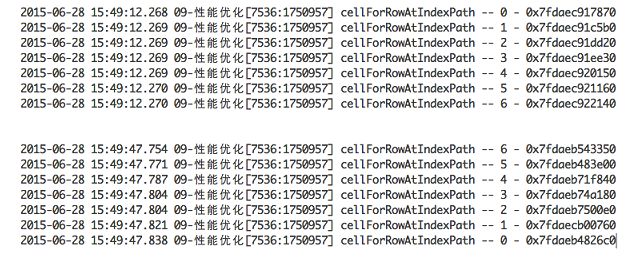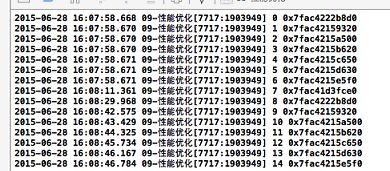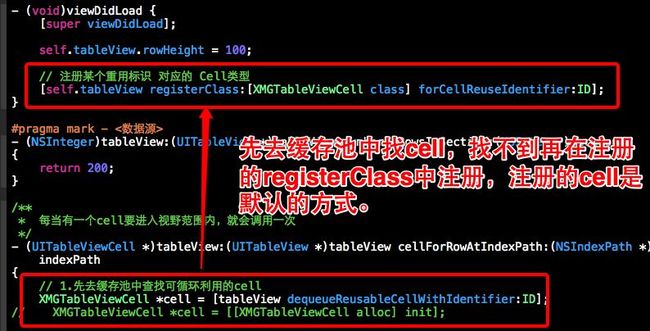- IOS 自定义代理协议Delegate
OKXLIN
ioscocoamacos
QuestionViewCell.h文件代码,定义代理协议@protocolQuestionViewCellDelegate-(void)cellIsOpenDidChangeAtIndexPath:(NSIndexPath*)indexPath;@end@interfaceQuestionViewCell:UITableViewCell@property(nonatomic,weak)iddel
- UI学习——cell的复用和自定义cell
Magnetic_h
ui学习
目录cell的复用手动(非注册)自动(注册)自定义cellcell的复用在iOS开发中,单元格复用是一种提高表格(UITableView)和集合视图(UICollectionView)滚动性能的技术。当一个UITableViewCell或UICollectionViewCell首次需要显示时,如果没有可复用的单元格,则视图会创建一个新的单元格。一旦这个单元格滚动出屏幕,它就不会被销毁。相反,它被添
- Flutter学习之九 ListView
MQ_Twist
极端很容易,平衡才是最难的。Flutter学习之八Container前言Flutter中的ListView的地位,就好比于iOS中的UITableView,算是最常用的可滚动组件之一,它可以沿一个方向线性排布所有子组件,并且它也支持列表项懒加载(在需要时才会创建)。默认构造函数我们看看ListView的默认构造函数定义:ListView({...//可滚动widget公共参数AxisscrollD
- iOS使用UIScrollView实现左右滑动UITableView和UICollectionView
泥孩儿0107
ios开发
iOS使用UIScrollView实现左右滑动UITableView和UICollectionView标签:iOS左右滑动UIScrollViewUICollectionView在UIScrollView中嵌套UITableView的文章很多,但是项目需要,需要嵌套UICollectionView,而UICollectionView和UITableView有很多不同,有些知识到现在也没搞清楚,一遍
- 简单实现浮动按钮+上滑隐藏按钮+下滑显示按钮
AlanGe
#import"SlideShowOrHideVC.h"@interfaceSlideShowOrHideVC(){CGFloatlastContentOffset;BOOLhideBtn;BOOLisBottom;}@property(nonatomic,strong)UITableView*tableView;@property(nonatomic,strong)UIButton*myButt
- IOS 21 发现界面(UITableView)单曲列表(UITableView)实现
sziitjin
IOSiosUITableView
发现界面完整效果本文实现歌单列表效果文章基于IOS20发现界面(UITableView)歌单列表(UICollectionView)实现继续实现发现界面单曲列表效果单曲列表Cell实现实现流程:1.创建Cell,及在使用UITableView的Controller控制器上注册Cell;2.获取data列表数据,并调用UITableView的reloadData(),将数据更新到列表;3.将data
- Swift Cell重用池机制以及UINib
司南_01b7
functableView(_tableView:UITableView,cellForRowAtindexPath:IndexPath)->UITableViewCell{letreuseID="taskCell5555555"//务必填写模版nib名(此处仅限于有cell模版,若无可忽略)letnib=UINib(nibName:"test5TableViewCell",bundle:nil)
- IOS 20 发现界面(UITableView)歌单列表(UICollectionView)实现
sziitjin
IOSiosUITableViewCollectionView
发现界面完整效果本文实现歌单列表效果文章基于IOS19发现界面(UITableView)快捷按钮实现继续实现发现界面歌单列表效果歌单列表Cell实现实现流程:1.创建Cell,及在使用UITableView的Controller控制器上注册Cell;2.获取data列表数据,并调用UITableView的reloadData(),将数据更新到列表;3.将data的Item数据绑定UITableVi
- tableView reloadData 刷新结束后再执行后续操作
wg刚
[self.tableViewreloadData]并不会等待tableview更新结束后才执行后续代码,而是立即执行后续代码做个试验:代码如下@interfaceViewController()@property(nonatomic,strong)UITableView*tableView;@property(nonatomic,strong)NSArray*dataArr;@end@imple
- 关于UITableView的Cell复用
bidianzhang
iOS工作数据结构iphoneios手机
UITableView是ios开发中使用率极高的一个控件,就我个人来说,几乎我做的每一个View上都有她的身影。但是很长一段时间,我对她的理解都很肤浅。对我来说触动较大的两个东西,一个是前面提到的自定义UITableViewCell,再有就是今天要提的这个复用了。
所谓复用表面意思来理解就是重复利用了。大致的工作原理就是:UITableView属于lazyloading,也就是只加载会在界面上显示
- iOS总体框架介绍和详尽说明
诗雅颂
ios移动端框架苹果
iOS是由苹果公司开发的移动操作系统,为iPhone、iPad、iPodTouch等设备提供支持。iOS采用了基于Unix的核心(称为Darwin),并采用了类似于MacOSX的图形用户界面。以下是iOS的总体框架介绍和详尽说明:UIKit框架:UIKit是构建iOS应用程序用户界面的主要框架。它包括了各种视图控制器(如UITableViewController、UIViewController)
- UICollectionView使用
搬砖行家
首先我们自定义一个UICollectionViewCell,和自定义UITableViewCell差不多,只是这里定义的是一个网格。-(id)initWithFrame:(CGRect)frame{self=[superinitWithFrame:frame];if(self){//设置CollectionViewCell中的图像框self.imageView=[[UIImageViewalloc
- UITableView实时刷新失效问题解决
风雪山神喵
要完成的UITableView是:能够在点击了UICollectionView的item之后,刷新自己。很长一段时间,都在迷惑,为什么不能点了一下之后,就能够展示正确的数据?要点很多下,点的头都晕了。。。其实解决方法是://消除数据延迟导致的失灵[selectedDayArrremoveAllObjects];[mytableViewreloadData];这样子,也有问题,就是刷新了两次。实际的
- 11、UITableView 的优化
十二月_9d09
1、正确的复用cell;2、设计统一规格的cell;3、提前计算并缓存好cell的高度(布局),因为heightForRowAtIndextPath方法是调用最频繁的方法;4、异步绘制,遇到复杂界面、遇到性能瓶颈时,往往是突破口;5、滑动时按需加载,这个在大量图片展示、网络加载的时候很管用;6、减少子视图的层级关系;7、尽量使所有的视图不透明化以及做切圆操作;8、尽量不要动态地add或remove
- View层规范
紫藤花的魂
在viewController代码里面#pragmamark-lifecycleviewDidLoadviewWillAppear...#pragmamark-UITableViewDelegatemethods#pragmamark-CustomDelegatemethods#pragmamark-eventresponse-(void)didTappedConfirmButton:(UIBut
- 'NSUnknownKeyException', reason: '[ setValue:forUndefinedKe...
叶舞清风
无语了屏幕快照2018-12-21下午3.59.59.png屏幕快照2018-12-21下午4.02.34.png[图片上传失败...(image-ff7e18-1545379428606)]
- UITableViewCell嵌套UICollectionView
myk
UITableView和UICollection的嵌套使用1.在控制器中创建TableView,设置数据源和代理-(void)viewDidLoad{[superviewDidLoad];self.arrData=[NSMutableArrayarrayWithObjects:@"末",@"将",@"于",@"禁",@"愿",@"为",@"曹",@"家",@"世",@"代",@"赴",@"汤",@
- iOS UITableViewCell 多选时改变编辑状态图片
浅宇落
UITableViewCell编辑状态时会出现多选按钮,最近项目有需求这里要改成自己的图片和去掉一下点击效果,总结一下:最终结果最终结果.png1.创建一个继承与UITableViewCell的类EditCellEditCell.h#importNS_ASSUME_NONNULL_BEGIN@interfaceEditCell:UITableViewCell/**下标数*/@property(no
- 设计模式
灰溜溜的小王子
一、编程中的六大设计原则?1.单一职责原则通俗地讲就是一个类只做一件事1.CALayer:动画和视图的显示。2.UIView:只负责事件传递、事件响应。2.开闭原则对修改关闭,对扩展开放。要考虑到后续的扩展性,而不是在原有的基础上来回修改3.接口隔离原则使用多个专门的协议、而不是一个庞大臃肿的协议,例如tableView的代理和数据源代理:UITableviewDelegate,UITableVi
- ios UITableView 使用UITableViewStyleGrouped(分组类型)顶部会有留白处理方式
90后的晨仔
方法一:CGRectframe=CGRectMake(0,0,0,CGFLOAT_MIN);self.tableView.tableHeaderView=[[UIViewalloc]initWithFrame:frame];方法二:CGRectframe=CGRectMake(0,0,0,0.0001);self.tableView.tableHeaderView=[[UIViewalloc]in
- SwiftUI -- 取消List的分割线
jancywen
iOS13List的底层是UITableView,可以直接设置UITableView的separatorStyle为none来去除分割线在iOS14中List的实现不在是UITableView了,可以设置.listStyle(SidebarListStyle()),但会有很大的边距。也可以用Scrollview+LazyVStack替代List,Thestackis"lazy,"inthatthe
- tableview
花开半夏又一年
tableview自适应高度functableView(_tableView:UITableView,heightForRowAtindexPath:IndexPath)->CGFloat{switchindexPath.section{case0:return250default:returnUITableView.automaticDimension}}方法二:functableView(_t
- UIRefreshControl
絮语时光杨
UIRefreshControl是iOS6自带的UITableView下拉刷新控件。(instancetype)init;@property(nonatomic,readonly,getter=isRefreshing)BOOLrefreshing;@property(null_resettable,nonatomic,strong)UIColor*tintColor;@property(null
- 代码规范
YannChee
ViewController的代码结构划分以后可以按如下#pragmamark-lifecycle#pragmamark-UITableViewDelegate#pragmamark-CustomDelegate#pragmamark-EventResponse#pragmamark-PrivateMethods(后期往往需要抽取重构的部分)#pragmamark-Getter&Setter
- 表格——swift
呵邢
classMovieViewController:UIViewController,UITableViewDataSource,UITableViewDelegate{//表格属性vartable:UITableView=UITableView(frame:CGRect(x:0,y:0,width:scrWidth,height:scrHeight),style:UITableViewStyle.
- iOS13 Compositional Layout
LINGSHOW
阅读原文前言UITableView和UICollectionView是我们开发者最常用的控件了,大量的流式布局需要这两个控件来实现,因此这两个控件也是Apple重点优化的对象。在往届WWDC中,我们已经受益于UITableViewDataSourcePrefetching、优化版Autolayout等带来的性能提升,以及UITableViewDragDelegate带来的原生拖拽功能。今年,App
- UITableView方法的执行顺序
Rumbles
1.它会调用代理方法确定有几行[TableViewControllernumberOfSectionsInTableView:]2.确定每行的表头高和表尾高(如果设定了HeardView和FooterView)[TableViewControllertableView:heightForHeaderInSection:][TableViewControllertableView:heightFor
- iOS tableViewCell最右边显示箭头,字符,自定义分割线
Lee坚武
效果如图:image.png1.添加iOS系统自带的cell的箭头cell.accessoryType=UITableViewCellAccessoryDisclosureIndicator;2.去掉tableviewcell的间隔下划线_tableView.separatorStyle=UITableViewCellSeparatorStyleNone;3.添加自定义间隔线,加在下面的这个方法里
- UITableView 轻松自定义多选cell 不使用系统样式
Adgerc
1、先看效果UITableView.gif2、需要什么效果1.点击全选需要全选cell2.在全选状态下,取消任意一个,全选按钮为normal转态3.一个一个选择,直到全部选择,全选按钮为selected状态3、实现3.1.在cell中添加一个按钮或者图片,用来显示选择或者未选择中的转态,在初始化时默认设为未选择的转态或者图片,和透明度为0或hidden=YES,我使用的是按钮做这个状态的现实,只需
- iOS开发笔记-113:兼容ios14
原味蛋炒饭
1:iOS14中UITableViewCell如果子控件是加到cell上的会被cell的contentView所遮挡,contentView会在最上层。所以按钮UIbutton之类的要加在contentView上2:刘海屏statusBarFrame.size.height由44变成了48
- LeetCode[Math] - #66 Plus One
Cwind
javaLeetCode题解AlgorithmMath
原题链接:#66 Plus One
要求:
给定一个用数字数组表示的非负整数,如num1 = {1, 2, 3, 9}, num2 = {9, 9}等,给这个数加上1。
注意:
1. 数字的较高位存在数组的头上,即num1表示数字1239
2. 每一位(数组中的每个元素)的取值范围为0~9
难度:简单
分析:
题目比较简单,只须从数组
- JQuery中$.ajax()方法参数详解
AILIKES
JavaScriptjsonpjqueryAjaxjson
url: 要求为String类型的参数,(默认为当前页地址)发送请求的地址。
type: 要求为String类型的参数,请求方式(post或get)默认为get。注意其他http请求方法,例如put和 delete也可以使用,但仅部分浏览器支持。
timeout: 要求为Number类型的参数,设置请求超时时间(毫秒)。此设置将覆盖$.ajaxSetup()方法的全局
- JConsole & JVisualVM远程监视Webphere服务器JVM
Kai_Ge
JVisualVMJConsoleWebphere
JConsole是JDK里自带的一个工具,可以监测Java程序运行时所有对象的申请、释放等动作,将内存管理的所有信息进行统计、分析、可视化。我们可以根据这些信息判断程序是否有内存泄漏问题。
使用JConsole工具来分析WAS的JVM问题,需要进行相关的配置。
首先我们看WAS服务器端的配置.
1、登录was控制台https://10.4.119.18
- 自定义annotation
120153216
annotation
Java annotation 自定义注释@interface的用法 一、什么是注释
说起注释,得先提一提什么是元数据(metadata)。所谓元数据就是数据的数据。也就是说,元数据是描述数据的。就象数据表中的字段一样,每个字段描述了这个字段下的数据的含义。而J2SE5.0中提供的注释就是java源代码的元数据,也就是说注释是描述java源
- CentOS 5/6.X 使用 EPEL YUM源
2002wmj
centos
CentOS 6.X 安装使用EPEL YUM源1. 查看操作系统版本[root@node1 ~]# uname -a Linux node1.test.com 2.6.32-358.el6.x86_64 #1 SMP Fri Feb 22 00:31:26 UTC 2013 x86_64 x86_64 x86_64 GNU/Linux [root@node1 ~]#
- 在SQLSERVER中查找缺失和无用的索引SQL
357029540
SQL Server
--缺失的索引
SELECT avg_total_user_cost * avg_user_impact * ( user_scans + user_seeks ) AS PossibleImprovement ,
last_user_seek ,
- Spring3 MVC 笔记(二) —json+rest优化
7454103
Spring3 MVC
接上次的 spring mvc 注解的一些详细信息!
其实也是一些个人的学习笔记 呵呵!
- 替换“\”的时候报错Unexpected internal error near index 1 \ ^
adminjun
java“\替换”
发现还是有些东西没有刻子脑子里,,过段时间就没什么概念了,所以贴出来...以免再忘...
在拆分字符串时遇到通过 \ 来拆分,可是用所以想通过转义 \\ 来拆分的时候会报异常
public class Main {
/*
- POJ 1035 Spell checker(哈希表)
aijuans
暴力求解--哈希表
/*
题意:输入字典,然后输入单词,判断字典中是否出现过该单词,或者是否进行删除、添加、替换操作,如果是,则输出对应的字典中的单词
要求按照输入时候的排名输出
题解:建立两个哈希表。一个存储字典和输入字典中单词的排名,一个进行最后输出的判重
*/
#include <iostream>
//#define
using namespace std;
const int HASH =
- 通过原型实现javascript Array的去重、最大值和最小值
ayaoxinchao
JavaScriptarrayprototype
用原型函数(prototype)可以定义一些很方便的自定义函数,实现各种自定义功能。本次主要是实现了Array的去重、获取最大值和最小值。
实现代码如下:
<script type="text/javascript">
Array.prototype.unique = function() {
var a = {};
var le
- UIWebView实现https双向认证请求
bewithme
UIWebViewhttpsObjective-C
什么是HTTPS双向认证我已在先前的博文 ASIHTTPRequest实现https双向认证请求
中有讲述,不理解的读者可以先复习一下。本文是用UIWebView来实现对需要客户端证书验证的服务请求,网上有些文章中有涉及到此内容,但都只言片语,没有讲完全,更没有完整的代码,让人困扰不已。但是此知
- NoSQL数据库之Redis数据库管理(Redis高级应用之事务处理、持久化操作、pub_sub、虚拟内存)
bijian1013
redis数据库NoSQL
3.事务处理
Redis对事务的支持目前不比较简单。Redis只能保证一个client发起的事务中的命令可以连续的执行,而中间不会插入其他client的命令。当一个client在一个连接中发出multi命令时,这个连接会进入一个事务上下文,该连接后续的命令不会立即执行,而是先放到一个队列中,当执行exec命令时,redis会顺序的执行队列中
- 各数据库分页sql备忘
bingyingao
oraclesql分页
ORACLE
下面这个效率很低
SELECT * FROM ( SELECT A.*, ROWNUM RN FROM (SELECT * FROM IPAY_RCD_FS_RETURN order by id desc) A ) WHERE RN <20;
下面这个效率很高
SELECT A.*, ROWNUM RN FROM (SELECT * FROM IPAY_RCD_
- 【Scala七】Scala核心一:函数
bit1129
scala
1. 如果函数体只有一行代码,则可以不用写{},比如
def print(x: Int) = println(x)
一行上的多条语句用分号隔开,则只有第一句属于方法体,例如
def printWithValue(x: Int) : String= println(x); "ABC"
上面的代码报错,因为,printWithValue的方法
- 了解GHC的factorial编译过程
bookjovi
haskell
GHC相对其他主流语言的编译器或解释器还是比较复杂的,一部分原因是haskell本身的设计就不易于实现compiler,如lazy特性,static typed,类型推导等。
关于GHC的内部实现有篇文章说的挺好,这里,文中在RTS一节中详细说了haskell的concurrent实现,里面提到了green thread,如果熟悉Go语言的话就会发现,ghc的concurrent实现和Go有点类
- Java-Collections Framework学习与总结-LinkedHashMap
BrokenDreams
LinkedHashMap
前面总结了java.util.HashMap,了解了其内部由散列表实现,每个桶内是一个单向链表。那有没有双向链表的实现呢?双向链表的实现会具备什么特性呢?来看一下HashMap的一个子类——java.util.LinkedHashMap。
- 读《研磨设计模式》-代码笔记-抽象工厂模式-Abstract Factory
bylijinnan
abstract
声明: 本文只为方便我个人查阅和理解,详细的分析以及源代码请移步 原作者的博客http://chjavach.iteye.com/
package design.pattern;
/*
* Abstract Factory Pattern
* 抽象工厂模式的目的是:
* 通过在抽象工厂里面定义一组产品接口,方便地切换“产品簇”
* 这些接口是相关或者相依赖的
- 压暗面部高光
cherishLC
PS
方法一、压暗高光&重新着色
当皮肤很油又使用闪光灯时,很容易在面部形成高光区域。
下面讲一下我今天处理高光区域的心得:
皮肤可以分为纹理和色彩两个属性。其中纹理主要由亮度通道(Lab模式的L通道)决定,色彩则由a、b通道确定。
处理思路为在保持高光区域纹理的情况下,对高光区域着色。具体步骤为:降低高光区域的整体的亮度,再进行着色。
如果想简化步骤,可以只进行着色(参看下面的步骤1
- Java VisualVM监控远程JVM
crabdave
visualvm
Java VisualVM监控远程JVM
JDK1.6开始自带的VisualVM就是不错的监控工具.
这个工具就在JAVA_HOME\bin\目录下的jvisualvm.exe, 双击这个文件就能看到界面
通过JMX连接远程机器, 需要经过下面的配置:
1. 修改远程机器JDK配置文件 (我这里远程机器是linux).
- Saiku去掉登录模块
daizj
saiku登录olapBI
1、修改applicationContext-saiku-webapp.xml
<security:intercept-url pattern="/rest/**" access="IS_AUTHENTICATED_ANONYMOUSLY" />
<security:intercept-url pattern=&qu
- 浅析 Flex中的Focus
dsjt
htmlFlexFlash
关键字:focus、 setFocus、 IFocusManager、KeyboardEvent
焦点、设置焦点、获得焦点、键盘事件
一、无焦点的困扰——组件监听不到键盘事件
原因:只有获得焦点的组件(确切说是InteractiveObject)才能监听到键盘事件的目标阶段;键盘事件(flash.events.KeyboardEvent)参与冒泡阶段,所以焦点组件的父项(以及它爸
- Yii全局函数使用
dcj3sjt126com
yii
由于YII致力于完美的整合第三方库,它并没有定义任何全局函数。yii中的每一个应用都需要全类别和对象范围。例如,Yii::app()->user;Yii::app()->params['name'];等等。我们可以自行设定全局函数,使得代码看起来更加简洁易用。(原文地址)
我们可以保存在globals.php在protected目录下。然后,在入口脚本index.php的,我们包括在
- 设计模式之单例模式二(解决无序写入的问题)
come_for_dream
单例模式volatile乱序执行双重检验锁
在上篇文章中我们使用了双重检验锁的方式避免懒汉式单例模式下由于多线程造成的实例被多次创建的问题,但是因为由于JVM为了使得处理器内部的运算单元能充分利用,处理器可能会对输入代码进行乱序执行(Out Of Order Execute)优化,处理器会在计算之后将乱序执行的结果进行重组,保证该
- 程序员从初级到高级的蜕变
gcq511120594
框架工作PHPandroidhtml5
软件开发是一个奇怪的行业,市场远远供不应求。这是一个已经存在多年的问题,而且随着时间的流逝,愈演愈烈。
我们严重缺乏能够满足需求的人才。这个行业相当年轻。大多数软件项目是失败的。几乎所有的项目都会超出预算。我们解决问题的最佳指导方针可以归结为——“用一些通用方法去解决问题,当然这些方法常常不管用,于是,唯一能做的就是不断地尝试,逐个看看是否奏效”。
现在我们把淫浸代码时间超过3年的开发人员称为
- Reverse Linked List
hcx2013
list
Reverse a singly linked list.
/**
* Definition for singly-linked list.
* public class ListNode {
* int val;
* ListNode next;
* ListNode(int x) { val = x; }
* }
*/
p
- Spring4.1新特性——数据库集成测试
jinnianshilongnian
spring 4.1
目录
Spring4.1新特性——综述
Spring4.1新特性——Spring核心部分及其他
Spring4.1新特性——Spring缓存框架增强
Spring4.1新特性——异步调用和事件机制的异常处理
Spring4.1新特性——数据库集成测试脚本初始化
Spring4.1新特性——Spring MVC增强
Spring4.1新特性——页面自动化测试框架Spring MVC T
- C# Ajax上传图片同时生成微缩图(附Demo)
liyonghui160com
1.Ajax无刷新上传图片,详情请阅我的这篇文章。(jquery + c# ashx)
2.C#位图处理 System.Drawing。
3.最新demo支持IE7,IE8,Fir
- Java list三种遍历方法性能比较
pda158
java
从c/c++语言转向java开发,学习java语言list遍历的三种方法,顺便测试各种遍历方法的性能,测试方法为在ArrayList中插入1千万条记录,然后遍历ArrayList,发现了一个奇怪的现象,测试代码例如以下:
package com.hisense.tiger.list;
import java.util.ArrayList;
import java.util.Iterator;
- 300个涵盖IT各方面的免费资源(上)——商业与市场篇
shoothao
seo商业与市场IT资源免费资源
A.网站模板+logo+服务器主机+发票生成
HTML5 UP:响应式的HTML5和CSS3网站模板。
Bootswatch:免费的Bootstrap主题。
Templated:收集了845个免费的CSS和HTML5网站模板。
Wordpress.org|Wordpress.com:可免费创建你的新网站。
Strikingly:关注领域中免费无限的移动优
- localStorage、sessionStorage
uule
localStorage
W3School 例子
HTML5 提供了两种在客户端存储数据的新方法:
localStorage - 没有时间限制的数据存储
sessionStorage - 针对一个 session 的数据存储
之前,这些都是由 cookie 完成的。但是 cookie 不适合大量数据的存储,因为它们由每个对服务器的请求来传递,这使得 cookie 速度很慢而且效率也不


